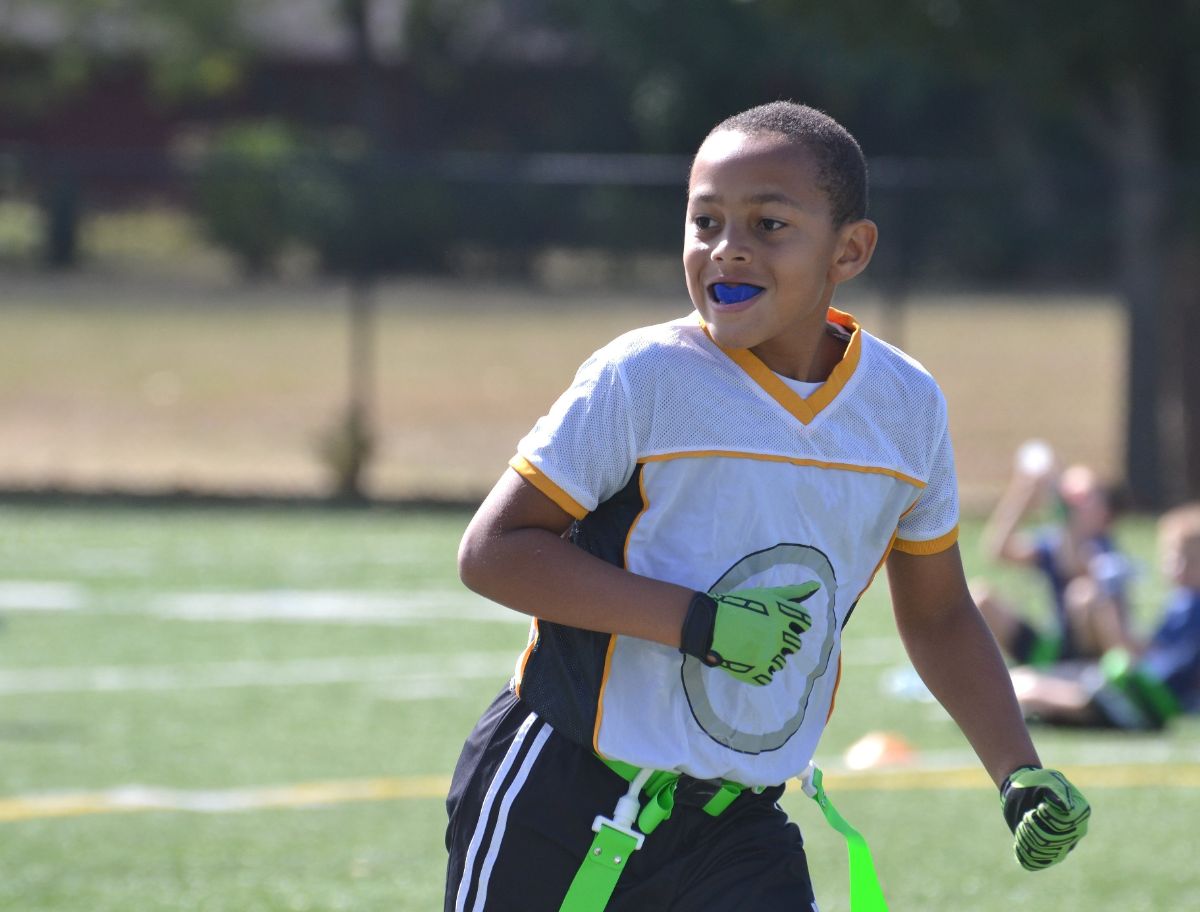With autumn comes fall sports season, including football, soccer, and volleyball. Here at Children’s Dental Center, we see so many patients who are active in sports in their schools or community. That makes this the perfect time to discuss how athletic mouthguards can keep smiles safe on the field and the court! For more information on the importance of athletic mouthguards for children and how they protect teeth when playing sports, keep reading below.
Why athletic mouthguards are important
As important as helmets and padding are when participating in sports, mouth protection is just as important for oral safety. While they may not be the first thing you think of when considering contact sports, properly fitted mouthguards can prevent so many lost or dislodged teeth due to sports injuries. These types of injuries are easily preventable with the use of a properly fitting mouthguard.
When it comes to preserving an athlete’s teeth, mouthguards are the easiest and most effective solution. They are affordable, easy to use, and can help prevent damage from occurring even when used in high-contact sports like football and hockey.
Mouthguards are not just for sports where heavy contact is expected, however. They provide cushion during light contact or low-impact sports, too. This is useful since even small amounts of pressure can irritate the mouth and may cause small cuts or abrasions to the gums and cheeks.
In fact, sports-related injuries to the mouth can result in not only cuts and scrapes along the gum line and cheek tissue, but can also lead to displaced and broken teeth, and broken bones in the jaw. If the teeth are not properly protected, the impact to the mouth can be much more intense and increase the risk of concussion.
Not only that, but the potential damage can have far-reaching effects as well. Some neck and jaw injuries plague athletes with stiffness and pain for years. Additionally, if a permanent tooth is significantly damaged, the child athlete will have to deal with maintaining the broken tooth for a lifetime with restorations, crowns, and/or dental implants.
Who should use a mouthguard?
Mouthguards are an excellent investment in any patient’s dental health. While a custom-fitted mouthguard is ideal, we encourage any kind of mouthguard over not wearing one at all when participating in sports and other physical activities.
Because dental injuries can be easily prevented with the use of a mouthguard, we recommend our Memphis-area patients wear them when participating in any competitive and recreational sports, particularly those in which impact, contact, or collision are likely to occur. The American Dental Association advocates for the use of a properly-fitted mouthguard during any of the following physical activities.
- Basketball
- Martial Arts
- Boxing
- Rugby
- Football
- Soccer
- Handball
- Water polo
- Field and Ice Hockey
- Wrestling
- Lacrosse
- Acrobatics
- Skateboarding
- Baseball
- Skiing
- Bicycling
- Skydiving
- Equestrian Events
- Softball
- Field Events
- Squash
- Gymnastics
- Surfing
- In-Line Skating
- Volleyball
- Racquetball
- Weightlifting
- Shot-Putting
- Any “Extreme Sports”

Types of mouthguards
There are generally three categories of mouthguards: ready-made, mouth-formed, and custom-made. Each type will vary in terms of cost, adaptability, comfort, and protection levels, so talk to your CDC dentist to determine the best fit for your child athlete.
Stock (ready-made)
These are the most common kind of mouthguard and tend to be widely available at most sporting goods stores. They are the least expensive type of mouthguard and do not require any visits to the dentist, making them a good choice for athletes who may be on a budget. They are, however, only available in a limited range of sizes and require the mouth to be shut to keep it in place. Because it is not adapted to the patient’s mouth, it can be less effective than other types of mouthguards.
Mouth-formed (boil and bite)
These mouthguards are self-adapting and, when placed in hot water, will soften. Once it is sufficiently cool, the patient will insert it into the mouth. It will adapt to the patient’s mouth by bite pressure, with some guidance from the tongue and fingers. If necessary, a dental professional can provide assistance with the final molding. This can be particularly helpful if the patient is undergoing orthodontic treatment with braces. This type of mouthguard is also widely available at various sports stores and is generally designed for use at home.
Custom-made
Custom mouthguards are available in most dental and orthodontic offices. They are created using impressions from a patient’s mouth and provide the best fit, adaptability, and comfort. While they are the most expensive option and will require a visit to the office to make, custom-made mouthguards are the absolute best way to fully protect a patient’s mouth when they are participating in sports of any kind.
While these mouthguards vary in price and comfort, they all provide protection from injury. Whatever type of mouthguard is selected, it should be comfortable, resistant to tearing, and made of a resilient material. It should also fit comfortably and securely, be easy to clean, and possess high-impact energy absorption that will reduce transmitted forces in case of an impact. Mouthguards should never restrict breathing.
As effective as mouthguards can be, we still ask that patients contact our office as soon as possible if the mouth takes a direct hit while playing sports. Depending on the circumstances, we may recommend an emergency dental appointment to one of our four area locations.
Caring for mouthguards
To help extend the life of a mouthguard, patients should rinse it before and after each use. A toothbrush and toothpaste can also be used to clean a mouthguard. It is a good idea to thoroughly clean mouthguards occasionally by gently rubbing them in cool, soapy water. Care should be taken to rinse it thoroughly afterward.
Mouthguards should be kept in a safe container with vents, and should never be left in the sun or in hot water. Patients should check for wear and tear regularly and replace the mouthguard when necessary.
For the best results, patients should not wear removable appliances like retainers with a mouthguard. Patients should put a mouthguard in for practice sessions as well as games. We also recommend visiting the dentist before every playing season and maintaining regular dental check-ups throughout the year. Feel free to bring your mouthguard into your regular dental check-up and we would be happy to check the fit.

Choose Children’s Dental Center for safer smiles
Protecting your child’s teeth and mouth with an athletic mouthguard is important when participating in organized sports or other recreational activities. Mouthguards are an essential piece of gear that should be part of any athlete’s equipment bag from an early age!
Although any mouthguard will offer some protection, a custom-made mouthguard offers the best fit, most comfort, and highest level of effectiveness. To learn more about obtaining a custom mouthguard from Children’s Dental Center in Germantown, East Memphis, Midtown, and Arlington, get in touch with our office today.
 Request an Appointment
Request an Appointment